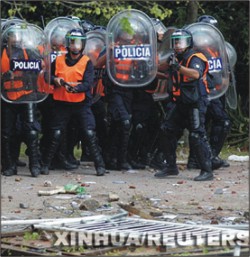Fact File
Above the law
Police accountability in Angola
"I said to them, 'Could it be that there are no laws in this country? You are police. You should protect the law, but you are breaking it.'"--A victim of forced evictions in Soba Kapasa, speaking in February 2007.
For many years the conduct of the police in Angola has resulted in serious human rights violations. As far as Amnesty International is aware, few cases are investigated and hardly any officers are brought to justice as perpetrators of human rights violations. On a number of occasions Amnesty International has requested information from the Angolan authorities concerning steps taken with regards to reported cases of human rights violations by the police, but with no response.
 The conflict that raged from independence in 1975 to April 2002 greatly disrupted the development of the police. In 2003 the Angolan National Police launched a 10-year Modernization and Development Plan, aimed at equipping the police with the resources and skills required to operate as a professional police force in a climate of peace. Since then there have been some improvements in police conduct, including a decrease in the number of arbitrary arrests and detentions, and in reported cases of torture and of extrajudicial executions of criminal suspects. Furthermore, human rights training is now part of the police training curriculum.
The conflict that raged from independence in 1975 to April 2002 greatly disrupted the development of the police. In 2003 the Angolan National Police launched a 10-year Modernization and Development Plan, aimed at equipping the police with the resources and skills required to operate as a professional police force in a climate of peace. Since then there have been some improvements in police conduct, including a decrease in the number of arbitrary arrests and detentions, and in reported cases of torture and of extrajudicial executions of criminal suspects. Furthermore, human rights training is now part of the police training curriculum.
However, Amnesty International continues to receive information about human rights violations perpetrated by police officers and about police impunity the failure to bring people responsible for crimes under international human rights law to justice, to establish the truth and to ensure victims receive full reparation. The only exception appears to be the prosecution and conviction of a police officer on 8 August 2006 for a killing that occurred on 1 January 2005.(1) Amnesty International believes that the ongoing impunity enjoyed by the police for human rights violations points to certain deficiencies in policing practice and, in particular, the absence of an effective police accountability system.
This report documents cases of human rights violations by the police in Angola between 2005 and 2007, which reveal a pattern of police abuse of power and the consistent failure to bring perpetrators of human rights violations to justice. It seeks to highlight the deficiencies in Angolan police accountability that contribute to, and exacerbate, these violations. The report concludes with recommendations for the improvement of police policies and practice, which, if fully implemented, would significantly contribute to a reduction in human rights violations by the police.
The report is based on information obtained during visits to Angola in May 2003 and February 2007. The information obtained during the May 2003 visit formed the basis of a memorandum by Amnesty International which was sent to the Angolan authorities, police and selected non-governmental organizations (NGOs) in September 2005. The authorities have not yet responded to the memorandum.
Source: Amnesty International.